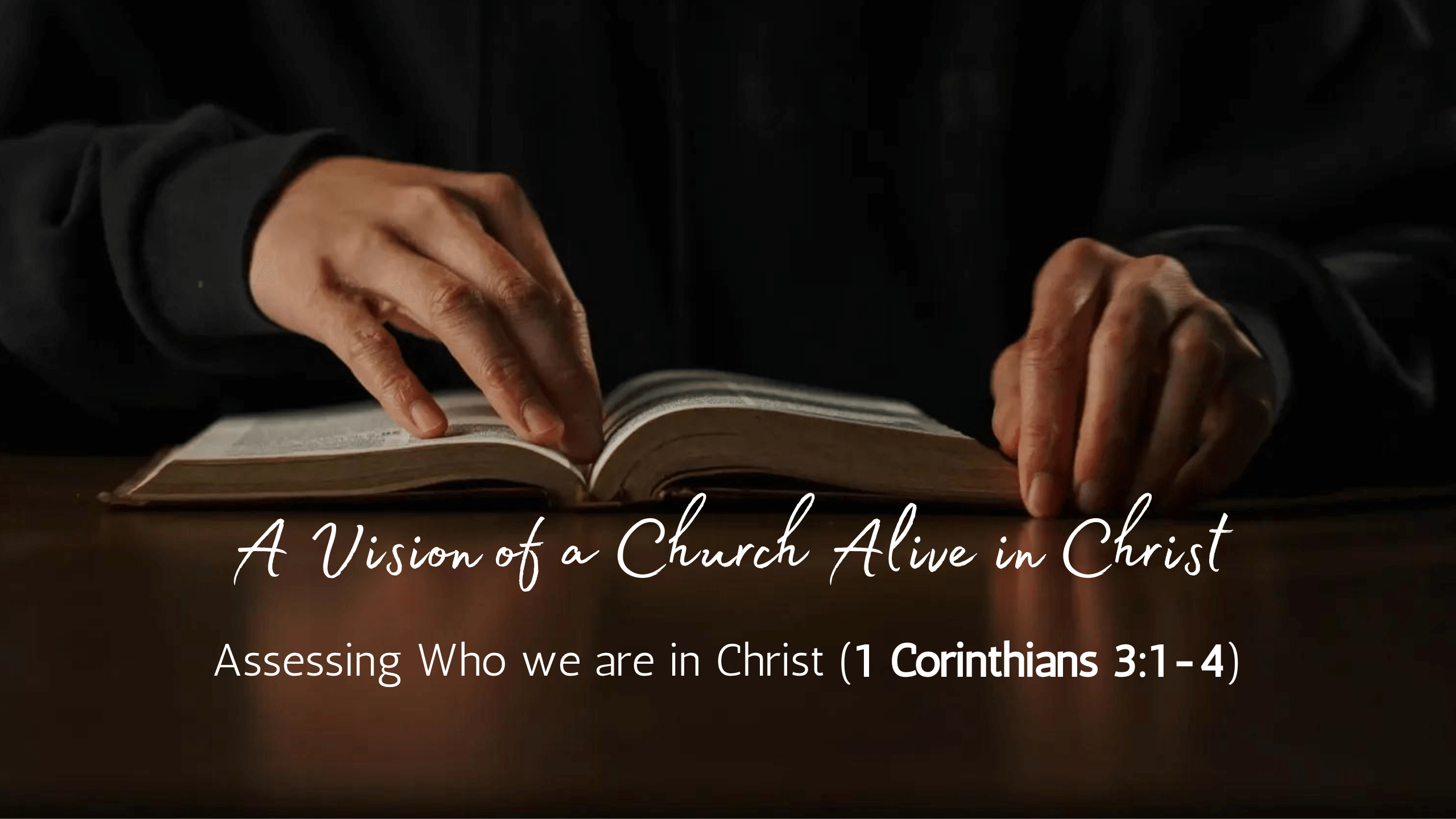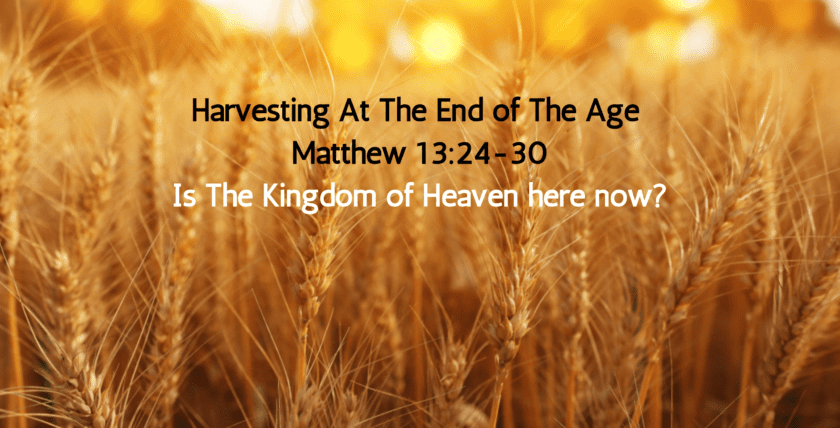Welcome to this episode of Sonday Life. I always look forward to being able to be with you all here, and I hope you get as much from these episodes as I get from interacting with you.
With the last episode, we began a six-part series entitled “A Vision of the Church Alive in Christ.” The last episode was the introduction to this series. If you missed it, I have a link in the notes below. In that introductory episode, we looked at what the church was like in the first century ‘when’ the Apostle Paul gave the church in Corinth this Vision of the Church Alive in Christ. This series is based on Paul’s words to the Corinthian believers in 1 Corinthians 3:1-16. In the last episode, we also discussed the identity crisis of the church then and now. As the Corinthians didn’t know ‘Who they were’ then, the church and believers today are having the same crisis of identity.
In this episode which I’ve entitled “Assessing Who We Are in Christ,” we’re going to answer two important questions for us and for the church today; 1) Who are we actually as believers in Christ? And 2) Who are we supposed to be as believers in Christ?
To answer these two questions, we’re going to read Paul’s assessment of the Corinthian believers in 1 Corinthians 3:1-4.
We all start our Christian rebirth as ‘infants in Christ.’ Paul founded the church in Corinth and spent a year and a half working and teaching there to ground these new believers in the faith. It’s understandable he says he gave them milk instead of solid food because they were brand new to following Christ. No one can know how to live as a believer in Christ right away. It’s not about your age or education or experience when you first believe in Jesus Christ; we all start out as newborn babes in Christ. We go from living a ‘worldly’ life to beginning life anew as a believer in something unknown to us. As infants, we need to learn the simple things about our new life first. The ‘milk’ as Paul puts it. We have to grow into being able to eat and digest stronger food or handle the more difficult issues of the kingdom of heaven.
We make the mistake of thinking because someone is older or smart or accomplished in their field that, when they first believe, we can plug them in right away into serving in the church or understanding how to live as a believer. But they’re still on infant formula, and they haven’t been able to undo their worldly instinctual way of thinking or acting.
This is damaging to a lot of new believers. Having a new believer get too involved in serving the body of Christ is like throwing a two-month-old in the deep end of the pool. Thinking a new believer can understand the deep things of Christ can get them lost and confused. Putting high expectations on a new believer has crushed a lot of new Christians. Often times when young Christians are sidetracked by being exposed to things too deep for them too fast, they can take a long time before they recover and move forward again.
New believers, because of enthusiasm, can want to serve and participate in the church, but desire and ability are two different things altogether. How many times have parents told an older child they’re supposed to keep an eye on their younger siblings only for things to go wrong? Or for the older child to rebel when the responsibility put on them is too much. The same is true when too much spiritual responsibility or expectations are put on young Christians before they’re ready.
When someone believes in Christ, they’re born again by the Spirit of God. They receive the Holy Spirit, and like newborn infants, they have to learn about their new life and grow into this whole new world they know nothing about. Even if they grew up around the church and around believers, but they weren’t a believer themselves, they could only guess what being a Christian was from a physical sense and not through actual spiritual understanding. They saw believing in Christ from a ‘worldly’ point of view, as a human being and not as a spiritual being.
Paul defines ‘worldly’ as acting like ‘mere humans.’ What he means by ‘worldly’ is thinking like a human, reasoning like a human, reacting like a human, and being a ‘mere human.’ We’re ‘mere humans’ when we follow our physical instincts of jealousy, quarreling, hatred, immorality, impatience, pride, envy, and willfulness.
Paul contrasts acting ‘worldly’ with ‘living by the Spirit.’ To ‘live by the Spirit’, therefore, would be the opposite of being ‘worldly.’ To ‘live by the Spirit’ is to think like the Spirit, reason like the Spirit, and react like the Spirit. It’s being Spiritual instead of being worldly. We’re spiritual when we follow our spiritual instincts, which we’ll talk about in a moment. For us to ‘live by the Spirit means the Spirit guides us as it influences and shapes our thoughts, actions, and character. To live as ‘mere humans’ means we’re guided by the flesh so that the flesh influences and shapes our thoughts, actions, and character.
Paul says the Corinthians are infants in Christ because they are bickering with each other. Their priorities are worldly instead of Spiritual. They’re aligning with leaders that impress them with their elegant speeches and quick wits and because they seemingly wield authority because of their reputations. In addition, they’re acting immorally, selfishly, pridefully, enviously, and sensually.
But they’re still believers in Christ and therefore saved by faith in Christ, and yet they’re ‘infants in Christ.’ Just like our children as they’re growing, they can do a lot of things that can hurt them, and they make a lot of mistakes, and they can disappoint us, but they’re still our children. The same is true with believers as we grow and learn about reacting spiritually instead of worldly. We’re learning and growing, but sometimes we’re sidetracked and influenced by our worldly instincts. But our Father doesn’t stop loving us. Some believers never grow out of the infant stage. Some believers become toddlers; some never progress beyond being pre-teens, and some stop at adolescence. Becoming an adult in Christ or a senior is a lifetime journey. It’s not an overnight happening. We want an immediate result, but that’s a worldly instinct, not a spiritual reality. Spiritual growth is a marathon, not a sprint.
To grow up physically, we have to eat healthy food, exercise, get educated, and have life experiences. The same is true for us to grow up spiritually. The difference is God gives believers the Holy Spirit to help us grow up, and the Spirit empowers us to transform our lives from the physical to the spiritual.
As you grew up, did your parents track your growth by marking your height on a wall or in a doorway? In order to know how or if we’re growing, we need to take an assessment of our growth. The same is true of our spiritual growth. We need to assess where we are in our spiritual development accurately. We need to know – Who we are, Actually, as a Believer in Christ?
Ephesians 4:22-24 shows us to reflect on whether we’re shedding our old ways or to what level we need to focus on making progress. In this verse, Paul is saying that “deceitful desires” hold us back from progressing spiritually. Deceitful desires are the worldly instincts that deceive us into thinking worldly ambitions are spiritual. For instance, believing the ‘Prosperity Gospel.’ God wants you to be wealthy. We focus on making money instead of spiritual riches because this deceitful desire for wealth has convinced us making money is spiritual. Another deceitful desire or worldly instinct is to seek teaching from someone that makes you feel good but doesn’t require any effort on your part rather than maybe making you slightly uncomfortable and making you work and stretch yourself to reach your capabilities. Deceitful desires prevent us from growing spiritually by deceiving us into thinking worldly instincts are spiritual.
In Colossians 3:1-2 Paul tells believers to assess where their focus lies. Is it a heavenly or worldly focus? Which do you feel is stronger in your life, a worldly or a heavenly focus?
The next thing we should ask ourselves is Who we are supposed to be as believers in Christ:
In 2 Corinthians 5:17, Paul says we’re supposed to be a ‘New Creation’ in Christ which should result in a noticeable change in our life. Assess whether you see change and to what level you see this change happening.
What changes should you be looking for? Paul tells us in Galatians 5:22-23 we should evaluate whether the fruit of the Spirit is increasing in our life and assess our level of growth in these areas.
These verses are a starting point for self-assessment, but we must always remember that spiritual growth is a lifelong journey. As believers, we need to assess regularly. Who we are actually in Christ compared to Who we are supposed to be as a believer in Christ. Then when we make our assessment, we should seek the Holy Spirit for guidance and help to continue to mature in Christ.
The church must perform the same assessment because the church is believers. If believers are ‘worldly,’ the church will be ‘worldly.’ If believers are ‘infants,’ then the church will be an infant in Christ spiritually.
Churches need to assess; Who they are actually as a church in Christ?
A church must assess whether it’s shedding worldly ideas about growth, success, brand, and popularity and evaluate to what level it needs to focus on being like the image of Christ in righteousness and holiness. Is the focus of the church on the things above or on the things of this world?
Churches also need to assess; Who they’re supposed to be as a Church in Christ?
If believers are supposed to be a ‘New Creation’ in Christ, shouldn’t the Church also be a ‘New Creation’ in Christ? Churches need to assess if being a ‘New Creation’ in Christ has resulted in creating a noticeable difference in the world. Are churches like worldly businesses and corporations? If so, then what needs to change so the church can progress to what it’s supposed to be in Christ? Are numbers and large church services an assessment of spiritual growth or worldly growth? Did the crowds follow Jesus grow, and was he popular? Yes, but that was because the power of his message changed lives. Has the church substituted the power of Christ to change lives for the worldly pleasure of being entertained? Entertainment might impress you, but it can’t change you from a worldly focus to a spiritual focus. At the same time, the church needs to evaluate whether the fruit of the Spirit is visible and increasing in the church, and if not, it needs to make the changes necessary to improve spiritual church growth.
Well, I hope Paul’s vision of the church alive in Christ has given you something to can take with you this week and think and pray about and ask God to lead you in your assessment of your growth in Christ. In the next episode, we’re going to look at “How” we grow in our spiritual life in Christ. I think this next episode in this series of “A Vision of a Church Alive in Christ” will be eye-opening for every believer that wants to grow their relationship with Christ but struggles with how to make that happen. We’re going to explain the mystery of how you can grow stronger in Christ.
So until the next episode, may God bless you with his grace and love always, in Christ. Thank you, and see you next time as the Lord wills.


